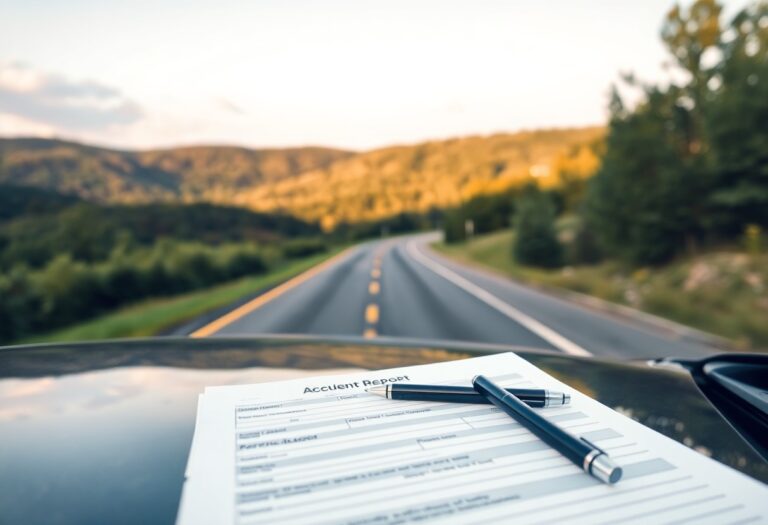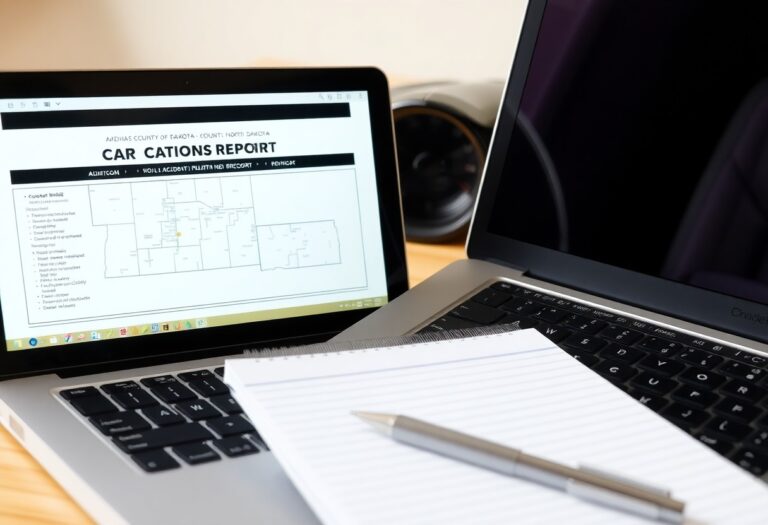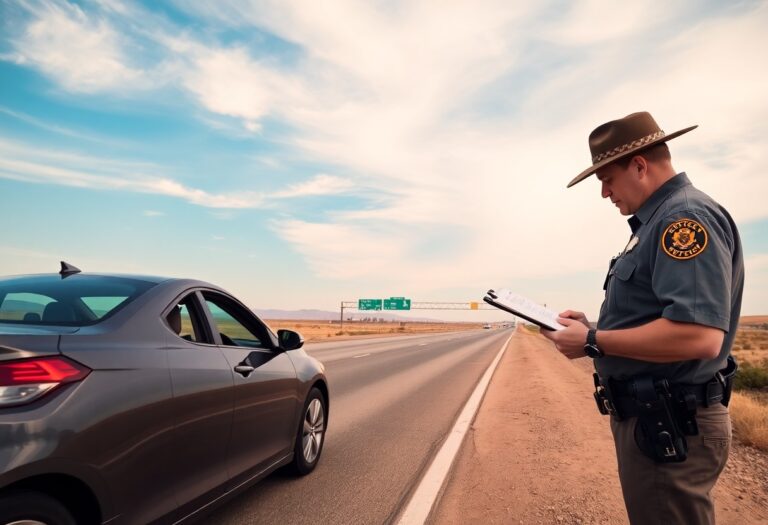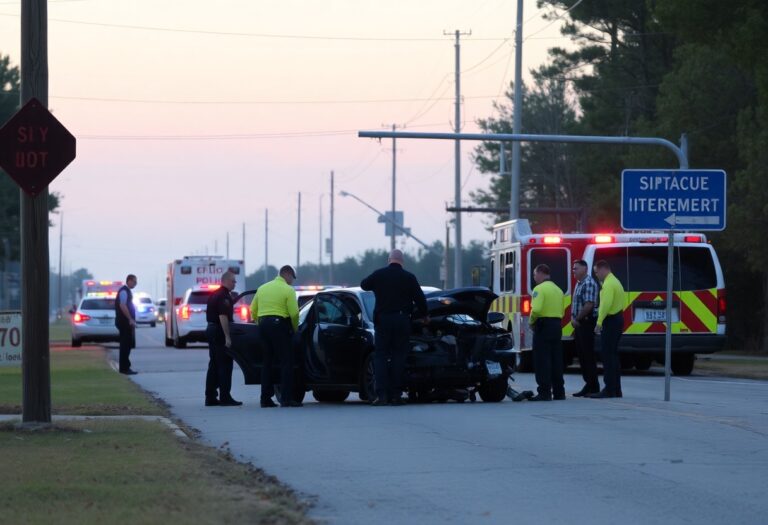Support is available for you in navigating the often complex process of obtaining car accident reports in Douglas County, Nebraska. If you find yourself involved in a vehicle collision, understanding how to access your accident report is not only beneficial for insurance claims, but also imperative for documenting any injuries or damages. In this blog post, you will discover the steps to acquire your report, resources available to assist you, and key details you need to consider to ensure a smooth experience during this challenging time.
Navigating the Post-Accident Landscape
Dealing with the aftermath of a car accident involves various steps that can significantly impact the outcome of any claims or legal proceedings. Knowing how to handle the situation can streamline the process, making it less stressful. From gathering information at the scene to filing reports, every detail matters in this challenging time.
Immediate Steps After a Car Accident
After a car accident, assessing your safety and that of others is the first step. If you’re in a position to do so, move vehicles out of traffic and call emergency services. Document the scene by taking photos of the damage and surroundings, which can be valuable later. Collect information from all parties involved, including names, contact details, and insurance information, as well as witness accounts that may help in future claims.
Engaging with Law Enforcement for Accurate Reports
Law enforcement plays a vital role in documenting the incident through official reports. Your cooperation with officers can lead to more accurate and detailed records, critical for any insurance claims or legal matters. Be honest and direct in your account of the event, and provide any relevant evidence you have, such as photos or witness names, to ensure all facts are correctly noted.
When interacting with law enforcement, clarity is key. Provide a concise overview of events while avoiding speculation about fault, as the officer’s role is to assess the situation without bias. Take note of the officer’s name and badge number and request a copy of the accident report once it’s available. This report serves not only as an official account but can also be pivotal in discussions with your insurance provider, making it important for your records.
Securing Your Car Accident Report
After an accident, obtaining your car accident report is vital for insurance claims and potential legal action. These reports serve as official documentation, detailing the circumstances of the incident and any involved parties. You can often acquire your report through the local police department or online portal, but having the necessary details at hand can expedite the process, ensuring you receive accurate information without delays.
Accessing the Report: What You Need to Know
Your accident report can typically be accessed within a few days after the incident. You’ll need to provide specific details such as the date and location of the accident, along with identifying information about yourself and any other parties involved. Many jurisdictions offer online requests or phone options, streamlining the process significantly.
Common Obstacles and How to Overcome Them
Accessing your report might come with challenges like system errors, delays, or even being informed that the report isn’t yet available. To ease the process, keep records of your accident and maintain communication with law enforcement agencies after your accident. If you encounter issues, be persistent. In some cases, speaking directly to a supervisor can accelerate your request.
Depending on the agency, some reports may be logged under a specific file number or case number, which is why having all relevant details is necessary. Additionally, you might face delays if the report is still under investigation or if there are administrative hold-ups. If the standard online procedure yields no results, try visiting the police station directly. Bringing along any documentation you have can often help facilitate a swifter resolution. Persistence and clear communication with the authorities can often help you navigate these hurdles and obtain your report without undue stress.
Leveraging Professional Help in Douglas County
Finding the right support after a car accident can significantly impact your recovery and claim process. In Douglas County, various professionals, including legal experts and experienced insurance agents, are available to assist you through the complexities of accident reports and claims. Utilizing their expertise ensures that you can effectively navigate the situation, understand your rights, and secure any compensation you may be entitled to.
When to Consult Legal or Insurance Experts
Consult legal or insurance experts if your accident results in significant injuries, vehicle damage, or disputes about liability. Their knowledge of local laws and insurance policies can provide invaluable guidance, helping you make informed decisions about your case. Engaging with professionals early on can also prevent costly mistakes that might affect your compensation.
Benefits of Working with Local Resources
Collaborating with local resources in Douglas County offers distinct advantages, such as familiarity with local regulations and relationships with local law enforcement. These connections can expedite obtaining records and help you navigate the claims process more efficiently. Moreover, local experts understand the specific challenges you may face, tailoring their advice to your unique circumstances.
Working with local resources allows for personalized support tailored to the community’s specific conditions. Local attorneys and insurance agents know the nuances of Nebraska law and the local insurance landscape, which can greatly enhance your chances of a successful outcome. For instance, they are aware of typical settlement amounts for similar cases in Douglas County, helping you set realistic expectations. Additionally, having someone who understands the local judicial system can streamline the process, ensuring that your claims are handled effectively and promptly.
The Impact of Accurate Reporting on Your Case
Accurate reporting directly influences the outcome of your car accident case, shaping the overall narrative and establishing factual evidence. The details you provide in your accident report can be pivotal in determining fault and responsibility. Clear and precise documentation may lead to quicker resolutions, less stress, and better outcomes in both insurance claims and potential legal actions. Consequently, ensuring that every detail is accurately recorded can significantly bolster your position in any ensuing disputes.
How Your Report Influences Insurance Claims
Your accident report is a vital tool for your insurance claim process. Insurers rely heavily on the details outlined in your report to assess liability and determine compensation amounts. If your report contains detailed accounts of the incident, eyewitness statements, and accurate descriptions of damages, it strengthens your claim and can lead to a fair settlement, particularly if you have to argue against another party’s insurance provider.
Legal Implications of Inaccurate Information
Inaccurate information in your accident report can have severe legal implications, including potential liability issues and even criminal charges. If vital details are misrepresented or omitted, it may lead to wrongful conclusions regarding fault or damages, negatively impacting your case. Inaccuracies can also undermine your credibility in negotiations and court proceedings, leaving you at a significant disadvantage against the opposing party.
Misrepresenting facts in your report, even unintentionally, can steer legal proceedings in an unwanted direction. For example, suppose you mistakenly record the wrong vehicle speed or details about road conditions. In that case, this misinformation can affect fault determination and may result in reduced compensation or even claims of fraud. Courts may impose penalties for perjury if inaccuracies are proven intentional, drastically complicating your case. Thus, taking time to ensure you provide precise information is not only beneficial but vital for protecting your rights and interests following a car accident.
Real-Life Support Networks in Douglas County
In Douglas County, a variety of support networks are available to assist you in the aftermath of a car accident. These networks can help you navigate the challenges that arise from injury and property damage, ensuring you have access to the resources you need to recover effectively.
Community Resources for Accident Victims
Local organizations like the Nebraska Department of Health and Human Services provide imperative resources for accident victims. They offer counseling services, financial assistance, and legal guidance, helping you meet your immediate needs while laying the groundwork for recovery.
Connecting with Local Advocacy Groups
Advocacy groups in Douglas County can play a pivotal role in aiding your recovery process. These organizations educate you about your rights and options after an accident, ensuring you have the support necessary to make informed decisions about your case.
By engaging with these local advocacy groups, you can tap into a wealth of experience and connections. Many groups collaborate with legal professionals and medical experts, providing you with direct access to specialized resources. Additionally, they may organize community events that foster a sense of belonging and empowerment, allowing you to connect with others who have faced similar challenges. Taking advantage of these connections not only enhances your understanding of the complex aftermath of a car accident but can also bolster your confidence as you progress through your recovery journey.
Conclusion
The resources available in Douglas County, Nebraska, provide you with the support you need to navigate the complexities of car accident reports. By utilizing local services, you can efficiently gather the necessary information and documentation for your case. Whether you require assistance from legal professionals or need guidance on obtaining reports from law enforcement, you are empowered to take the right steps forward. Your proactive approach will help ensure that you secure the information required to protect your rights and interests.













